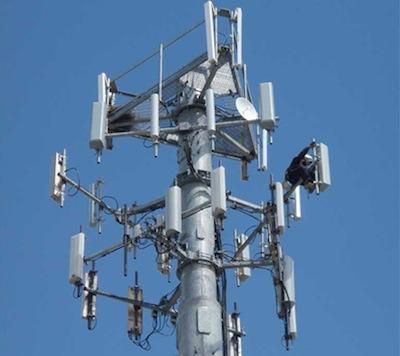It's an age-old question: Why are my download speeds so much faster than my upload speeds? To answer that we need to hop in the time-machine to the days of dial-up modems. Don't worry, we won't stay long.
Back in the mid- to late-1990's we had devices that hooked our computers up to our phone lines called a "modems". These modems would modulate digital information from your computer into analog beeps, boops, whistles, and static, then demodulate the response back into 1's and 0's. For a long time both upload and download speeds were both painfully slow, and nearly identical. When 56K modems came out they could (theoretically) reach 56,000 bits per second down — but only 33,600 bits per second up. Back in the day this was because home users were limited in the power they could use to push a signal back upstream, but ISPs weren't bound by the same restrictions (or so the modem manufacturers told us).
Luckily we were able to get out of the dial-up days fairly quickly and now have purely digital Internet connections (no modulating or demodulating needed). It's the same on our smartphones as it is on our home computers — all digital, all the time.
Interestingly, the differing upload versus download speeds have carried through to both wire-line and wireless data plans, for somewhat similar reasons.
Average Use
For the most part, typical users consume much more data than they produce . On my Android-powered smartphone I generally consume about 2GB per month — and that's just cellular data, Wi-Fi not included. My uploads for the same period are substantially less — generally around 200MB.
End-users generally create things like emails, Tweets, and Facebook posts. These are all very small when compared to what we consume: music, movies, web pages full of images, custom ROMs, themes, podcasts. You get the idea.
Because that's the case, service providers can limit the upload speeds to discourage people from pushing significant amounts of data such as pirated material, live webcam feeds, and hosting their own FTP and web servers. Of course if you need to do the latter they'll gladly allow it — for a price.
Power Requirements
Usage scenarios aside, let's think about power consumption for a moment.
Watts are a unit of power that essentially measures the rate of energy conversion. Electrical energy, stored in your battery, is used by the circuitry to run your phone, and eventually to power your antenna. With me so far?
Notice that I said "energy conversion" not "energy consumption". That's because energy can neither be created nor destroyed (something called "the law of conservation of energy"). Instead, the power in your battery is converted into something else: light, heat, sound waves, motion, and some of it is even radiated out of your antenna in the form of radio waves (Bluetooth, Wi-Fi, cellular voice, cellular data). If you ask most people, their battery doesn't have that much power stored in it. Of course that's a relative statement, but we'll go with it for now.
The amount of power that you can radiate from your phone's antenna is significantly less than the amount of power that can be radiated from those huge cell towers. The lower the power of the transmission, the slower the speed. This is exemplified by the speeds that you see when you are close to the tower (full bars) versus observed speeds when you're far from the tower (1 bar). Even though you're still outputting the same amount of power, it has a further distance to travel to the tower, so data-loss is higher and speeds are negotiated down accordingly.
Download speeds, the speed at which you can get data to your phone, isn't as limited by power since the cell tower is connected to the electrical grid — not a little battery. Therefore, more data can be pushed with lower signal-loss, resulting in higher download speeds than upload speeds.
Of course there are other reasons, but those two should provide more than ample reason for most readers. For those of you that have more detail (or want to elaborate on my simplifications of electronics theory), please share your expertise in the comments below!

